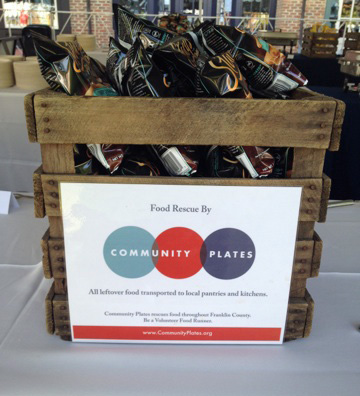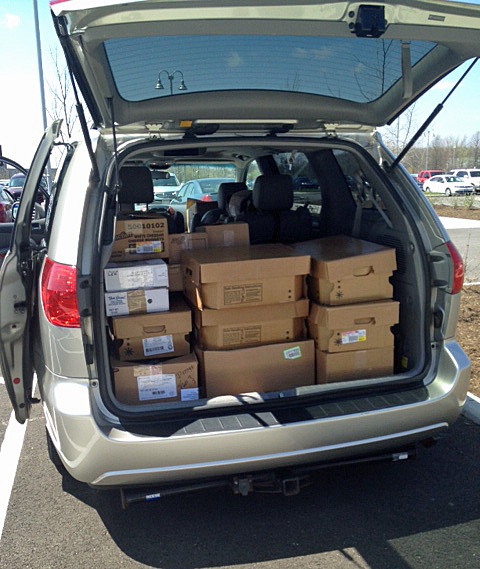NolaVie partners with Propeller: A Force for Social Innovation on this series of articles focusing on New Orleans entrepreneurs devoted to social innovation. Today we take a look at a digitally-monitored program that connects food donors with the food insecure.

Community Plates matches food donors and recipients using an online algorithm.
Even if math isn’t your thing, the numbers are provocative: 22.3 percent of New Orleanians are “food insecure” – meaning they don’t always know where their next meal is coming from — and 40 percent of food in this country goes to waste.
Social entrepreneur Lauren Rudzis is all about connecting the dots, and those particular dots beg to be connected. So she is bringing Community Plates to New Orleans, where we will be the fifth city in the country to implement this software-driven, volunteer-based approach to combating hunger.
“Hunger in the U.S. makes no sense,” says Rudzis, a Maryland native and LSU grad who spent two post-graduate years with the Peace Corps in Cambodia. “Community Plates is a very simple model to address that.”
The web-based concept was conceived by start-up entrepreneur Jeff Schacher in Connecticut in 2011. It has three components: Food donors, such as restaurants, groceries, or farmers who have leftover food; food agencies, such as shelters, soup kitchens, churches or family agencies, who need it; and runners, the volunteers who take the food from point A to point B.
“It’s a direct transfer,” Rudzis explains. “When you look at food insecurity in America, it’s not about a lack of food, but the logistics of getting it where it needs to go. We’re just making the connections.”
Donors, agencies and volunteers can all fill out a GoRescue application online at the Commmunity Plates website. Once a volunteer signs up, he or she can access a calendar with dates and times of needed runs, and volunteer for whatever one is convenient. Community Plates New Orleans is currently lining up donors and agencies. Rudzis hopes to start actual food runs within a month or so.

Food runs are designed to take no longer than a trip to the local grocery store.
Runs are designed to take no longer than a trip to the local grocery– 20 to 50 minutes. The app, available on a smartphone as well, gives the runner a map and directions, down to which door to go to and whom to ask for. Once the run is complete, the volunteer fills out an online report, so that Community Plates can track what food went where and when it was delivered.
Food donors can also indicate online what excess food they have for someone to pick up. The 1996 Good Samaritan Act dictates that donors cannot be held liable for food given in good faith. But the excess food that is available is generally quite healthy.
“That apple with a small bruise on it is perfectly OK to eat, but grocery shoppers will pass it up. Same with cans that are dented, or have torn labels.”
Perishables remain usable several days beyond a “sell by” date. And that unsold produce at the farmer’s market can go to someone’s table for a few days afterward.
“We already have many organizations that take leftover food and compost it,” Rudzis says. “Massachusetts has just passed a law that you can’t waste food. Certainly the goal of any store or restaurant is to be able to utilize all food, but there is inevitably canned or perishable food left over.”
Certainly getting leftover food to people in need is not a new concept. Agencies like Second Harvesters Food Bank have been doing it, and doing it well, for years. But Community Plates avoids the storage concerns and uses technology to streamline the process, by connecting donors and agencies and having volunteers sign up online to make a same-day transfer.
“We call it a food rescue revolution,” Rudzis says. “Instead of the old model of warehousing and trucking, we’re going directly to the people.
New Orleans, Rudzis believes, is a perfect city for the model. We’re a food city. And the smaller footprint makes point-to-point delivery faster and easier than in bigger metropolises. But the attitude here helps as well.
“New Orleanians really get it – that need, that sense of community. There is so much openness and sharing and love here.”
ChangeWorks is a partnership between NolaVie and Propeller: A Force for Social Innovation. Send feedback to renee@nolavie.com or cgans@gopropeller.org.
 NOLAbeings Multimedia artist Claire Bangser created NOLAbeings as a portrait-based story project that marries...
NOLAbeings Multimedia artist Claire Bangser created NOLAbeings as a portrait-based story project that marries...  Voodoo in New Orleans: Reviving history: New Orleans fortune telling This article takes a deep dive into the history of Voodoo in New Orleans, its hybridization with Catholicism, and its present-day place in the city's culture. The author visits fortune-tellers in the French Quarter, using their guidance as a tool for introspection rather than a deterministic predictor of the future. Through her experiences in New Orleans, the author feels a mystical connection to both the past and the future.
Voodoo in New Orleans: Reviving history: New Orleans fortune telling This article takes a deep dive into the history of Voodoo in New Orleans, its hybridization with Catholicism, and its present-day place in the city's culture. The author visits fortune-tellers in the French Quarter, using their guidance as a tool for introspection rather than a deterministic predictor of the future. Through her experiences in New Orleans, the author feels a mystical connection to both the past and the future. 